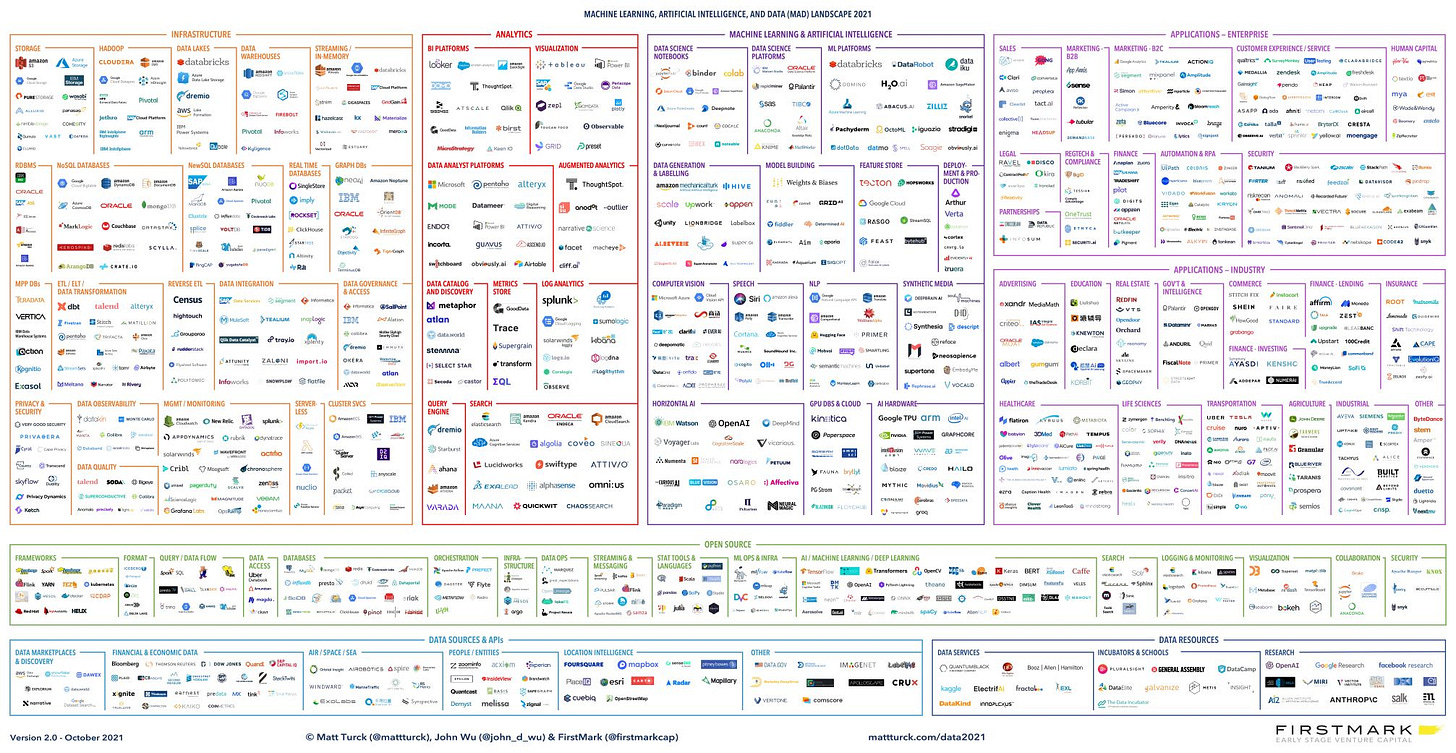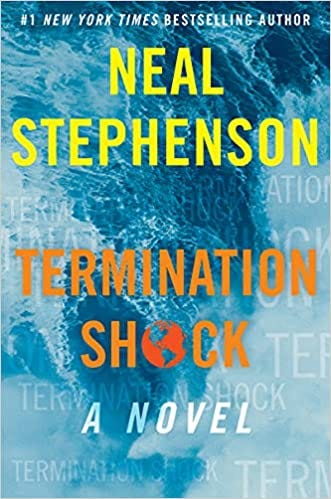On becoming a data-driven organization
"Everything Starts Out Looking Like a Toy" (No. 66)
This week’s toy: a simple beat machine to get the mood going. I love it! It reminds me of the Casio PT-30 keyboard that filled many hours of downtime pre-internet. Edition No. 66 of this newsletter is here - it’s November 1, 2020.
The Big Idea
Matt Turck and team have compiled the 2021 Machine Learning, AI, and Data Landscape, and your first reaction might be “where do I go to be able to zoom this and read the items? (the answer is here).
What’s the premise of this landscape? Turck writes:
the fundamental trend is that every company is becoming not just a software company, but also a data company.
But if becoming a data company requires evaluating all of these technologies, it is also a tall task to understand what exactly is required of a “data company.”
Data companies:
Are aware of the connections between their systems
Make incremental changes to improve the customer experience
Know what they are doing and measure it
These are decisions that come before understanding which systems are needed to fulfill these goals. They are not easy - you’re talking about the key strategic actions to support customers - and they start with the basics.
What is the requirement of a data company?
Benn Stancil - co-founder of Mode - makes a great argument for the components of a data-driven company in the talk he gave at a recent conference.
The keys for success, as Benn explained:
Deliver a differentiated experience
Meet the customer where they are
Progressively reveal information
Here’s the talk:
Stancil goes on to identify rules for success with data. Although some of these steps depend on systems, the individual systems are not called out.
The operative process of becoming a data-driven company incorporates many of the tools in a landscape like the one above. It also is not driven by the need to select a software product for every use case. Companies that do this well use software capabilities across products to create a great experience for the customer.
Building Principles for Handling Data
The takeaway slide that Stancil shared is a great start for any company looking at the data landscape and trying to determine how they could possibly make a difference given all of the different kinds of companies and problems served in the data landscape.
He sets out 6 principles:
Companies that want to become data companies need to start with their customers in mind. The best way to start is to walk along with the prospect or customer as they take their customer journey. Yes, I mean literally walking in the front door if you are a lead and then thinking about the systems that need to know about that lead and the changes that occur to the lead (or contact) as the prospect takes action.
Next, you write down any other systems that would need to know that information as the prospect or customer moves through other stages of the customer journey.
For example, does your marketing automation software (that sends an email) need to know if a customer has recently had a customer service issue? Yep.
Does your customer service system need to know if a customer has bought previously? Yep.
Does your engineering system need to know about the product usage by the company? Yep.
Combining all of these items into an integrated customer experience is the challenge of creating a data company.
What’s the takeaway? Evaluating the software you need should be driven by the underlying goals of improving the customer experience. Creating a data-driven (or data-inspired) customer journey starts when you imagine what things should feel like for that customer.
A Thread from This Week
Twitter is an amazing source of long-form writing, and it’s easy to miss the threads people are talking about.
This week’s thread: on the trend of “classic reproductions” that are not exactly like the original. Check the twist at the end …
Links for Reading and Sharing
These are links that caught my eye.
1/ What data tools should you use - there are a lot of code tools you could use to manage your data operations. Why not start with a list curated by a data professional?
2/ A markup language for cooking - When you look inside the fridge to see what’s there, it’s often a challenge to decide what to cook for dinner. Having a structured recipe language might help. Well, if you were really great about cataloging what was in the fridge. Still, it’s an interesting model to disrupt recipe sites by having a standard way to write recipes. Now, all I need is an online recipe to CookLang converter to tell me what I can cook with what’s in the fridge.
3/ A potential use for crypto - I’ve been struggling to understand Crypto in all its forms. This is not a post about NFTs or anything like that. It’s the first description I’ve found of a DAO - a decentralized autonomous organization - that might make sense. Let’s put aside the idea of an NFT (non fungible token) and the massive environmental impact of those actions. What’s interesting about a DAO is that it provides an organizational method to align value with actions in the world, not just in jpeg museums. If this worked, it could be a club accruing value for good. It’s a bit too early to tell.
On the Reading/Watching List
Reading: Solutions to existential threats. Neal Stephenson is back with a new novel on climate change.
I’m optimistic that in the same way Stephenson envisioned the Internet, he is also able to suggest some real problems to fight the climate crisis.
Watching: Ken Burns’ newest film on Muhammad Ali. I don’t follow boxing now, and feel conflicted about it as a sport. As a kid, I was transfixed by Muhammad Ali. Seeing him in his prime is amazing.
What to do next
Hit reply if you’ve got links to share, data stories, or want to say hello.
I’m grateful you read this far. Thank you. If you found this useful, consider sharing with a friend.
Want more essays? Read on Data Operations or other writings at gregmeyer.com.
The next big thing always starts out being dismissed as a “toy.” - Chris Dixon







